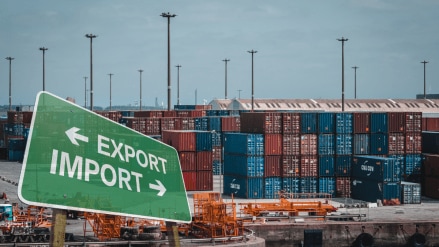Bharat Forge chairman & MD Baba Kalyani minced no words on Thursday when he said that a 50% import tariff by the US was something that no industry in India could absorb. “It is simply undoable. You might as well not have a business at all,” he said unequivocally, adding that a long-term political solution to the trade issue with the US was important.
Thursday saw the first import duty levy of 25%, announced last week by the US, kick in, implying that Indian goods were costlier than peers in the US. The additional levy of 25% announced on Wednesday will kick in after 21 days. Both gems and jewellery, and apparel exporters, who count the US among their largest markets, have said that American buyers have begun cancelling orders, leading to potential job loss and disruption of business.
America accounted for 33% of India’s total garment exports in 2024. The US market is India’s largest for polished diamonds and studded jewellery worth $10 billion as of FY25.
“We will reroute our products through other countries after studying the tariff structure of those countries with the US. We will set up manufacturing units there quickly,” Gems & Jewellery Export Promotion Council (GJEPC) chairman Kirit Bhansali said.
“Dubai is the nearest destination for us. We will also look at rerouting studded jewellery through Mexico,” Bhansali added. The United Arab Emirates faces only a 10% tariff, while Mexico is subject to a 25% duty, lower than India’s new rate of 50%.
India’s largest organised retailer Titan is also said to be considering relocating some of its manufacturing to West Asia to maintain access to the US market at lower tariffs.
Meanwhile, Trump’s tariffs have no direct impact on the country’s carmakers since they do not export to the US. But the auto components industry will get impacted, Maruti Suzuki chairman RC Bhargava said, as their exports to the US is significant. India exports $7 billion worth of auto components to the US. While the US was already levying a 25% duty on cars, small trucks and their parts from all countries since May 3, the tariff on components for commercial vehicles, earth-moving equipment and tractors was 10%. This will now rise to 50%, hurting half of auto component exports to that market, experts said.
Industry’s Response: Rerouting and Relocating Production
“The tariffs are unreasonable, unjustified and uncalled for. The government is going to do what is good for the country,” Bhargava said, when contacted.
Terming the imposition of additional tariffs on India unfortunate, JSW Cement MD Parth Jindal said that sentiment in the country could be hit with the move. “There will be no direct impact on either steel, cement or power industry because of the tariff hike, but sentiments could suffer,” Jindal said. The $23-billion JSW Group has a presence in steel, cement, power, paints and automobiles, among other sectors.
Nadir Godrej, chairperson, Godrej Industries, said that it was time to be self-reliant in an uncertain world. “While it is not efficient to do so in a global world. But, with protectionism growing, we have to rely on ourselves for our needs,” Godrej said, adding that companies could turn to their crisis management manuals put in place during the Covid-19 pandemic.
“We were importing chemicals from China for our business. However, when much of China was under lockdown during Covid-19, we began manufacturing these raw materials locally to cater to our manufacturing needs. While we went back to importing our raw materials from China once the lockdown was lifted. But, it gave us a broad template of how to do business during a crisis,” he added.
A Long-Term Vision: Crisis as a Catalyst for Reforms
Leading two-wheeler maker Bajaj Auto’s exports have limited exposure to the US market, making it relatively less impacted by Trump’s tariffs. But, the supply of rare earth magnets remains “uncertain”, which could hurt production, company chairman Rajiv Bajaj said.
“Exports to the US are small and primarily focused on our KTM and Triumph motor bikes, which annually sell 10,000 and 5,000 units each,” Bajaj said. “We won’t lose this share, as the upcoming months are traditionally slow in terms of exports ahead of winter,” he added.
Reliance Industries chairman Mukesh Ambani said in the company’s annual report, released on Thursday, that “continuing geopolitical and tariff-related uncertainties may affect trade flows and demand-supply balance.”
A Vedanta spokesperson said that the company saw no immediate impact to its business from the recent tariff hike. Aluminium exports to the US by Vedanta was less than 3% of its sales mix, while it had no steel exposure to the American market.
Former G20 Sherpa Amitabh Kant, Mahindra Group chairman Anand Mahindra and Upgrad co-founder and investor Ronnie Screwvala have all urged policymakers to treat the tariff shock as a springboard for structural reform and change. Harsh Goenka, chairperson of RPG Enterprises, was even sharper in his response to the US’ increased tariffs, saying that “India bows to none”.
“Trump has provided us a once-in-a-generation opportunity to take the next big leap on reforms. Crisis must be fully utilised,” Kant said.
Mahindra said that the “law of unintended consequences” was operating in the tariff war unleashed by the US, suggesting that India could boost domestic spending much like Canada and the European Union and also improve ease of doing business.
“Let’s unleash entrepreneurship in every sense. It’s an opportunity to set the India consumption story to new levels; partner with those who want to grow the India market,” Screwvala tweeted on Thursday.
Niranjan Hiranandani, founder & MD, Hiranandani Group, said that every challenge was an opportunity. “We should be more Atmanirbhar. If I am exporting to US, I would be upset. It is time we look at our own interests,” he said.
